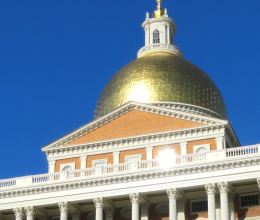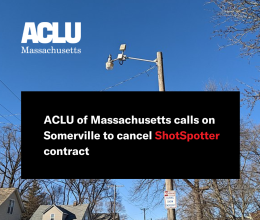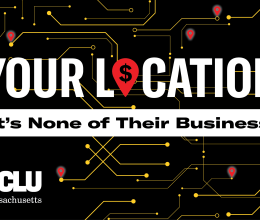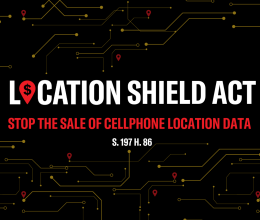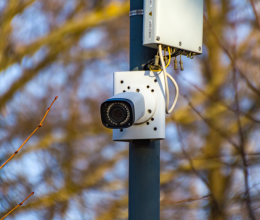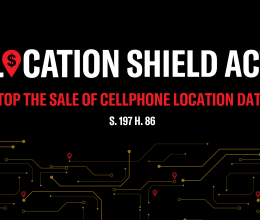
The ACLU of Massachusetts, together with privacy experts, racial justice advocates, and community activists, testified today in favor of legislation that would introduce stronger regulations on the government’s use of dangerous, often racially biased face recognition technology.
The Joint Committee on the Judiciary heard testimony on H.135/S.47, An Act to Regulate Face Surveillance, a bill that would prohibit government agencies from using face surveillance to track or monitor people in places like schools, libraries, parks, and municipal buildings; require police to obtain a warrant before conducting a face recognition search, except in emergency situations; and establish due process protections for criminal defendants subjected to face recognition searches.
“Last year, the legislature enacted and Governor Baker rejected sensible and urgently needed restrictions on the most dangerous applications of face recognition technology,” said Kade Crockford, director of the Technology for Liberty Program at the ACLU of Massachusetts. “Since then, even companies like Facebook and Amazon have stopped offering the technology to police departments because of its inherent privacy risks and the threat it poses to people of color in particular. Now, lawmakers have a chance to pass some of the strongest civil rights and privacy protections in the country, to ensure face surveillance is never used to violate anyone’s rights. We urge them to seize the opportunity, to ensure future generations are protected from the most dangerous forms of face surveillance tracking. Privacy won’t protect itself.”
“The use of facial recognition technology raises significant concerns regarding racial bias and personal privacy and any use of it by the government should only be allowed if narrowly authorized with adequate oversight” said Senate Majority Leader Cindy Creem (D-Newton). “This legislation strikes the right balance by allowing its use for serious public safety investigations and emergencies, while maintaining appropriate due process protections.”
While the police reform law enacted in 2020 includes some basic restrictions on police use of face recognition, it does not—due to the governor’s threat of a veto—include safeguards against broader government use of face surveillance to track people as they go about their lives in public spaces. The new bill restores this and other civil liberties protections, as previously approved by lawmakers in both the House and Senate.
“The House took an important first step last session to begin putting rules in place about government use of face surveillance. Said State Representative Dave Rogers (D-Cambridge). “As we’ve continued to study the issue, it’s clear that more remains to be done to protect privacy and due process. Facial recognition technology is too invasive to be used without serious guardrails.”
Currently, seven municipalities in Massachusetts have banned use of face surveillance by their local governments: Boston, Brookline, Cambridge, Easthampton, Northampton, Springfield, and Somerville.
“Regulating the use of this technology in schools and public spaces is vital for our communities,” said State Representative Orlando Ramos (D-Springfield). “Our families should be free from being tracked while going to work or walking around their neighborhoods.”
Earlier this month, Facebook announced it would shut down its face recognition system and delete the faceprints of more than 1 billion people. In recent years, Amazon, Microsoft, and IBM have also heeded ACLU and other activists’ calls, pausing or stopping the sale of their face recognition products to police.
Background:
Launched in 2019, the ACLU of Massachusetts’ “Press Pause on Face Surveillance” campaign has built awareness about the civil liberties concerns posed by face surveillance and the need to bring government use of the technology under democratic control. The campaign has so far led to seven municipal bans on and limited statewide regulations of police use of the technology.
The ACLU is leading a nationwide movement to defend privacy rights and civil liberties against the threat of unregulated face recognition surveillance. As part of ACLU-led campaigns, multiple jurisdictions have prohibited police use of face recognition technology, including San Francisco, Berkeley, and Oakland, California; Boston, Brookline, Cambridge, Easthampton, Northampton, Springfield, and Somerville, Massachusetts; New Orleans, Louisiana; Jackson, Mississippi; Portland, Maine; Minneapolis, Minnesota; Portland, Oregon; King County and Bellingham, Washington; and the states of Virginia, Vermont, and Maine. New York state also suspended use of face recognition in schools and California suspended its use with police-worn body cameras.
For more information about “Press Pause on Face Surveillance,” go to: http://www.aclum.org/presspause
For more information about the ACLU of Massachusetts, go to: http://www.aclum.org
